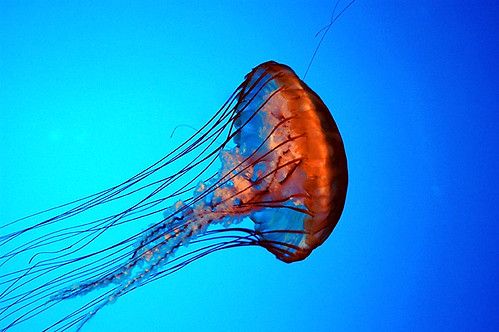| | |
 | | Dolphins | by Nico Kaiser on Flickr |
| - Dolphins have 100 teeth , but they don't use them for eating. They use them to catch the fish and then they swallow the whole fish.
- Large dolphins can weigh up to 11 tons.The smaller dolphins can weigh up to 90 pounds.
- Dolphins are mammals and they are warm blooded. They can swim up to 260 meters below the ocean.
- Dolphins live in groups. There are about 10 to 12 dolphins in one group.
|
 | | Great White Shark Cage Diving | by hermanusbackpackers on Flickr |
| - There are more than 350 different kinds of sharks in the ocean. You are more likely to drown in the ocean than to get bitten by a shark.
- Sharks have very good hearing. They can hear a fish in the ocean a mile away.
- Shark wounds heal very quickly. If a shark gets hurt, it heals in about 1, maybe 2 weeks.
- Most sharks eat fish or other small sharks. Larger sharks feed on dolphins or sea-lions. They have very sharp teeth so they can rip through skin, flesh, and bones.
|
 | | Tampa Aquarium 9/13//07 | by kthypryn on Flickr |
| - Every one thinks that any animal in the ocean can swim but seahorses can't swim very well so they prefer to grab on to coral
- Seahorses are the animals in which the male and not the female, gives birth and care for their young.
|
 | | she don't use jelly | by brainware3000 on Flickr |
|
- Jellyfish has been around for millions of years - even before dinosaurs
- Jellyfish don’t have brains.
- Jellyfish do not have a
respiratory system since their skin is thin enough that the body is oxygenated
by diffusion
- Jellyfish are composed of more
than 90% water.
|
 | | Electric eel | by chrisbb@prodigy.net on Flickr |
| - An Electric Eel is
supposed to produce electricity sufficient enough to light upto 10 electric
bulbs.
- They have poor vision and use
electro location, low level electrical fields, to navigate.
- Higher levels of voltage are
used to kill prey or defend themselves from predators.
- They have unusual breeding behavior - a male makes a nest from his saliva into which the
female lays her eggs. As many as 17,000 young will hatch from the eggs in one
nest.
|
| - An Octopus has three hearts and colour of its blood is blue
- Octopuses squirt clouds of ink and change colour to create
camouflage. They sever their tentacles off to get out of desperate situations
and these re-grow.
- Female octopuses lay around 40,000 eggs and die when the eggs
hatch and rise to the upper waters of the sea.
- Octopuses use the suckers on
their tentacles to help them move, grip slippery surfaces and for tasting. They
look for clams, fish, crayfish and crabs.
- The blue-ringed octopuses are
the most venomous creatures on this earth. They are small in size but have the
ability to kill 26 human beings within a span of few minutes.
|
 | | Oyster heaven | by miamism on Flickr |
| - Oysters can
change from one gender to another and back again depending on which is
best for mating
- Oysters have a three chambered heart, colorless blood
and a pair of kidneys.
|
 | | Sea Sponges | by pussnboots on Flickr |
| - Sea Sponges have no head, mouth, eyes, feelers, bones, heart, lungs or brain and yet they are alive
- Sea Sponges live on the ocean floor, they attach themselves permanently
to a solid location under the water and they do not move around.
- Sponges can contain 16,000 other animals inside of it.
- If part of a sponge breaks off, then it becomes an entirely new
sponge.
|
 | | Shrimp for Tonight's Surf & Turf | by Pink Sherbet Photography on Flickr |
| - A Shrimp's heart is in their head
- Every
shrimp is actually born as a male and then becomes female, as it matures.
- The
female shrimp can lay up to a million eggs at once that only take a couple of
weeks to hatch.
|
 NeoK12.com - Educational Videos, Lessons, Quizzes & Presentations
NeoK12.com - Educational Videos, Lessons, Quizzes & Presentations







